by Katya Egorova
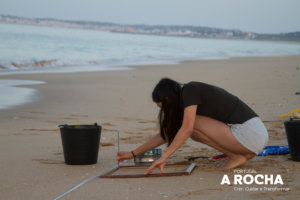
Microplastics are one of the most uncontrolled pollutants in our oceans. Microplastics can range from 1-5mm, making them hard to remove. It is no longer possible to clear the oceans of them completely, but it is still possible to contain the continuous spread.
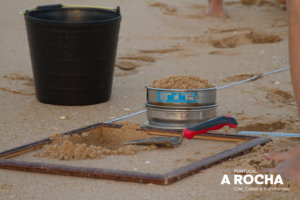
Our research is conducted by collecting sand samples from the beaches in Lagos, Alvor, Portimão and Ferragudo. To see a more detailed picture, sand samples are taken at several sites of each of these beaches throughout the year. There are a total of 21 transects (each 100 meters long), with five random spots selected in each transect for collecting samples.
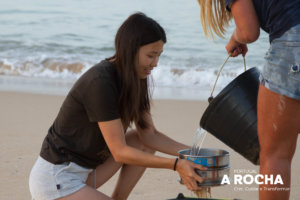 To start the work, the right time of day is chosen when the tide reaches its highest point and an hour later the work can begin to be carried out at this location. Sampling is carried out as follows: the sand is collected in a square of 0,5 meters and five centimeters deep. This sand is sifted through a double sieve using filtered sea water as a facilitating fluid, which sifts out particles of the required microplastic size (1-5 mm).
To start the work, the right time of day is chosen when the tide reaches its highest point and an hour later the work can begin to be carried out at this location. Sampling is carried out as follows: the sand is collected in a square of 0,5 meters and five centimeters deep. This sand is sifted through a double sieve using filtered sea water as a facilitating fluid, which sifts out particles of the required microplastic size (1-5 mm).
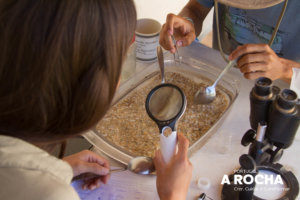 The samples taken are then prepared for analysis: the contents are placed in a container with high salinity water and the microplastic contained in the sand pops up to the surface, allowing to determine the plastic type and other properties. Data collection takes into account not only the microplastics found but also the terrain characteristics, season, weather and other conditions where the sample was taken.
The samples taken are then prepared for analysis: the contents are placed in a container with high salinity water and the microplastic contained in the sand pops up to the surface, allowing to determine the plastic type and other properties. Data collection takes into account not only the microplastics found but also the terrain characteristics, season, weather and other conditions where the sample was taken.
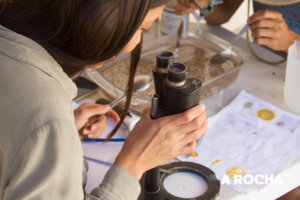
Our project goal is to research the microplastics contained in some of the sandy beaches of southern Portugal, which can then be used in a global collection of data. Our data collection will help to raise public awareness of microplastic pollution, inform those in coastal habitat management, and thereby contribute to the behavioral change that will keep microplastics out of the marine environment. Our research methods are based on the recommendations given in the Guidance on Monitoring of Marine Litter in European Seas; produced in 2013 by the Technical Subgroup on Marine Litter of the European Commission’s Marine Strategy Framework Directive (MSFD).

Sponsored by project number: 2018-1-PT02-ESC11-005590 of the European Solidarity Corp